Birmingham 2022: Timeline TV on helping host broadcaster Sunset+Vine create the most spectacular Commonwealth Games yet
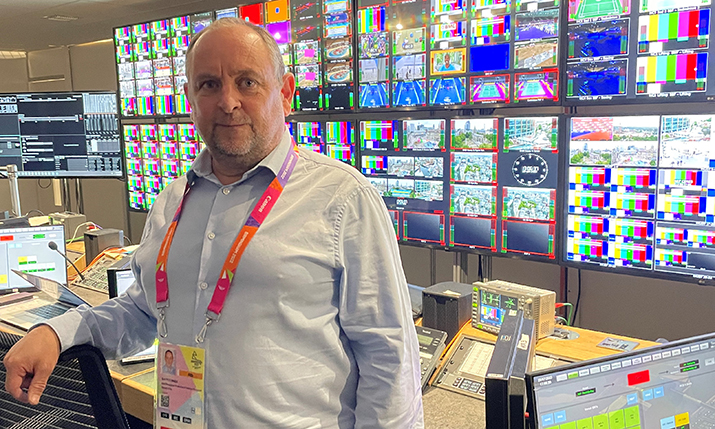
Dan McDonnell, CEO at Timeline TV, at the IBC based at Birmingham’s NEC on day one of the 2022 Commonwealth Games
As the Commonwealth Games opens its doors to an excitedly awaiting public, host broadcaster Sunset+Vine is now able to admire all the hard work that has gone into bringing this huge event together over the last two years.
Working closely with its technical services partners and the organising committee, Sunset+Vine is pulling off a spectacular event starting with the opening ceremony, taking place on 28 July. One of its key partners in the Commonwealth Games 2022 is Timeline TV, which is working on everything happening at the NEC, which is the location of the IBC, the host broadcast operation, and several sporting events.
“It’s quite a large operation at the NEC, because it’s handling every single sport, every single recording, every single clip that’s made for social media editing. It’s all going through that hub. It’s very big operation”
Timeline TV is also helping to connect all the sports venues involved in this production to the IBC so the other technical services providers can share their content with Sunset+Vine, and from there out to the rights-holding broadcasters across the world.
Speaking to SVG Europe two days before the opening ceremony, Dan McDonnell, CEO at Timeline TV comments on where the team and set up is in terms of being ready to roll: “On the IBC side, that’s handed over. There’s always going to be niggles that people find, but 99% is finished and working, and people are in the building operating. The OBs started rigging today. We’ve got a couple of days to rig those, but that’s more traditional; that’s trucks rolling up with cable.
“The challenge is that it’s quite a big area. We’ve had to cable all of the NEC halls back to NEC Hall 2 [where the host broadcast operation is running]. There’s quite a lot of cable and infrastructure to put in so we’ve had a large rig team there, flying cables over all of the rooftops of the NEC. That’s now pretty much in. We’ve had artic trucks of equipment turning up with all the cameras and lenses and cable. It’s been a large logistical exercise, but we are two days to go and should be ready.”
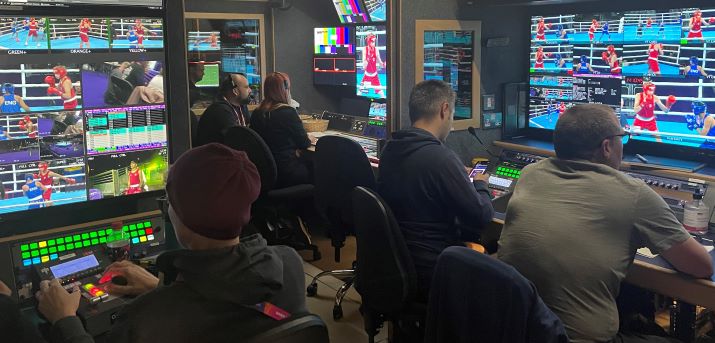
Inside Timeline’s UHD1 truck, stationed inside the NEC to cover the boxing at the Commonwealth Games 2022
Games of two halves
McDonnell says Timeline TV has been working with Sunset+Vine for almost two years on the project. He comments: “There are two halves of it; the IBC and the sports we’re covering. We’ve built the IBC area for the organising committee and host broadcasters, so that’s a large area in Hall 2 at the NEC. It was an empty hall a month ago! We’ve built all the rooms with floors and false raised access flooring, and then installed all of the bays for all the equipment, and then we’ve got all the normal rooms that you’d see at an IBC, so a big master control room (MCR) operation, 20 loggers logging all the sports, 20 editors making clips for social media, lots of edit suites, a big IP director system, and all of the production staff working there.
“We’re making [Sunset+Vine’s] Games Channel, which is a channel for broadcasters who aren’t going to take a produced feed. We’re doing six other produced feeds as well. So there’s six multi-channel services going out which broadcasters can take.
“We’ve set up a broadcast transmission operations centre (BTOC) at every venue. So at every venue there’s a cabin where we get the feeds from whoever’s doing the OB [for that venue], and then we’ve installed 10 gig fibre back to the IBC, and all of the feeds come back to the IBC.”
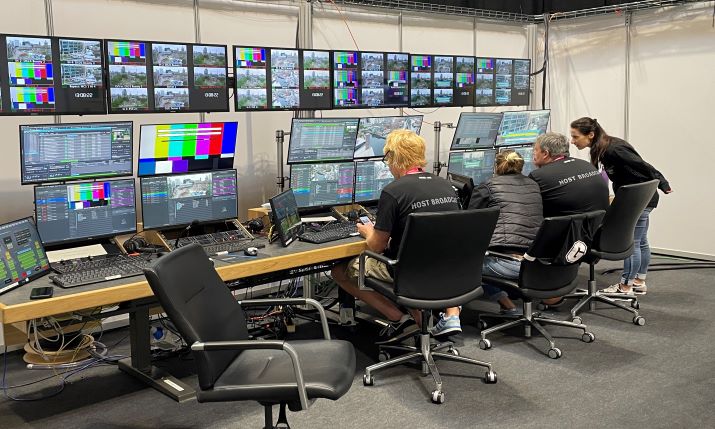
Inside the MCR on the first day of the Commonwealth Games
McDonnell continues: “So Hall 2 at the NEC is the hub of everything and for all of the feeds from all the sports [for the Games]. [The network spans] the country, because the velodrome is in London, and that feed is coming into the NEC, and then things like beauty cameras are on four buildings around Birmingham. They’re all coming into the NEC, and that is the heart of it.
“We’ve built and staffed that, and we’ve also built for any rights holder broadcasters who have come [to Birmingham] like the BBC or Channel 7 and have requested space, all the rooms that they want. We have cabled them up to our central facility so they can get all the feeds and all their talkbacks. So it’s quite a large operation at the NEC, because it’s handling every single sport, every single recording, every single clip that’s made for social media editing. It’s all going through that hub. It’s very big operation.”
Also, Sunset+Vine has created specific solutions for remote coverage for broadcast rights holders that are not on site. Its partner Timeline TV has helped design and deliver these solutions.
Says McDonnell: “We’ve given rights holders that aren’t on site the ability to switch their own feeds remotely so they can still get into everything. They can access multi viewers over the internet showing all the feeds, and then they can remotely switch destinations at the IBC, so rather than having to send a large amount of equipment and do it all themselves, we’ve built a remote solution for them so they’re able to remotely get all of their feed and what that they want. They can still see all of the sports, but they don’t have to come to site and take them all into their own set up and do it. We’ve done it for them and given them remote control.”
Additionally, the organising committee has provided rights holding broadcasters with an asset management portal, which is enabling all the rights holder broadcasters to have instant access to the archive. Sunset+Vine has worked with Timeline TV on this, which is streaming 30 feeds to the portal during the Games.
This portal service has been created by the organising committee with Pulselive, a Sony Sports company, and Ci Media Cloud from Sony, while Timeline TV is encoding the feeds at the IBC.
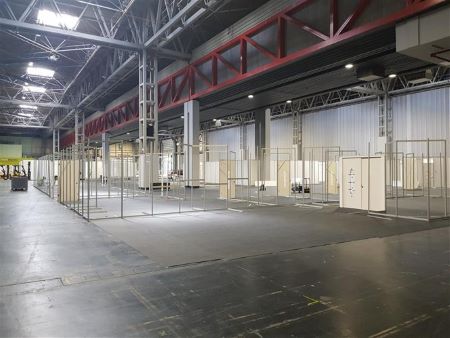
Inside the NEC at the end of June 2022, the IBC was nowhere to be seen….
Outside broadcast logistics
McDonnell goes on to talk about the sports that Timeline TV is covering for Sunset+Vine: “We’re also providing OB trucks to facilitate all of the sports within the NEC.” Those sports Timeline is working on at the NEC are badminton, boxing, netball, weightlifting and para powerlifting, plus table tennis and para table tennis.
Adds McDonnell: “[All the sports being held at the NEC are] in halls around NEC Hall 2, and we’ve cabled them all back to NEC Hall 2 where we’ve got all of our OB trucks. We’ve got five OB trucks covering all of those events. That’s a separate part of the operation.
“Basically, anything that happens in the NEC, whether it’s the host broadcast area or sports coverage, it’s through Timeline TV facilities, and we’ve got about 150 people working across the NEC now at the moment.”
“We’ve got a really great team with us. It’s quite a large project for Timeline; we’ve not really done a huge host broadcast production this large before. It’s one of the biggest we’ve done in terms of kit, people involved, and focus”
Timeline TV is using five of its trucks to cover the NEC sports, with UHD1, UHD2, UHD3, and purchased from the Arena kit sale, UHD4 and UHD5. “It’s the first time all of those trucks have worked there together,” says McDonnell.
He goes on: “Then we’ve got about 50 cameras across those sports. Lots of EVS’s, lots of slow-mos, mini cameras, VTs RF cameras. We’re doing multiple coverage so the table tennis and the badminton have got two different fields of play we’re filming, so we’ve got two directors in the truck on two vision mixers. It’s a huge operation.”
On other OB partners working with Sunset+Vine to deliver the 2022 Commonwealth Games, a myriad are involved: EMG is on aquatics at the Sandwell Centre, the marathon in the city centre, cricket at Edgbaston, the mountain bike, road race and time trial cycling at Cannock Chase in Wolverhampton, judo and wrestling at the Coventry Arena, rugby sevens at the Coventry Stadium, and triathlon and para triathlon at Sutton Park; NEP is covering athletics and para athletics at the Alexander Stadium, gymnastics at Arena Birmingham and lawn bowls and para lawn bowls at Victoria Park; Gravity is covering the 3X3 basketball and wheelchair basketball and beach volleyball at Smithfield; and Cloudbass is on the cycling track at Lee Valley, plus hockey and squash at the University of Birmingham.
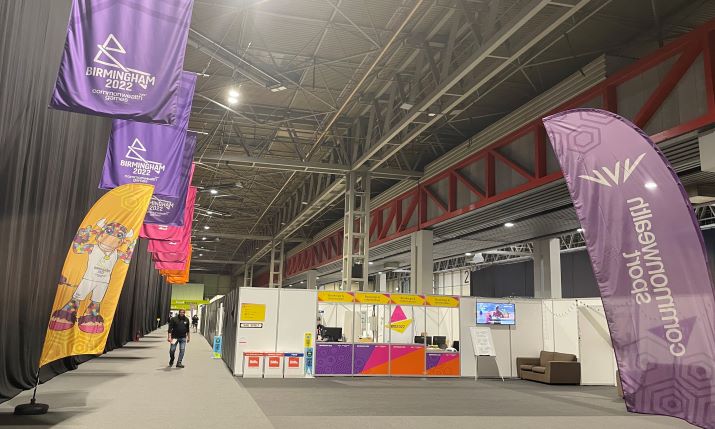
At the NEC, the IBC is now up and running for the Opening Ceremony of the Commonwealth Games
Technical set up
Quinn Cowper, head of engineering at Timeline TV, comments on how the set up has gone over the course of the last month: “We’ve been here since 2 July. It’s going really, really well. We’ve got a really great team with us. It’s quite a large project for Timeline; we’ve not really done a huge host broadcast production this large before. It’s one of the biggest we’ve done in terms of kit, people involved, and focus.
“We’ve been working on it for the last five months,” he goes on. “There’s a lot of technology in terms of the IP circuits that we’re doing the 14 venues. Some venues are [here] at the NEC, so they’re locally connected, but we’ve been working with an IP-based team to get all of the circuits back from those venues.”
That team Cowper refers to is cloud and IP solutions provider, Techex, which has helped Timeline TV to configure the network across all the Games venues for the host broadcaster, Sunset+Vine to create the backbone network for all productions. Comments Cowper: “We’ve bought a load of new hardware that [Techex has] been configuring over the last five months to get that up and running.”
Timeline TV is bringing all the feeds from every OB firm back to the NEC, with help from Techex. Adds Cowper: “We’ve built 14 kits that go out to each venue’s BTOC cabin. The OB [at the venue] ends their circuit at the cabin and we have our engineer with our equipment and then we go through all the BT and Vodafone networks to get all of the circuits back to the IBC, then we decode all of the circuits again and we bring them all into the MCR stack for the operators there. They then switch the circuits for the rights holders and all of the circuits then leave to all the countries all over the Commonwealth.
“We’ve been building that [capability] for the last three weeks because we’re the core of [the network],” notes Cowper. “We’ve got to be very consistent and working all the time, because everybody’s looking at us to make the circuits for all of these venues.”
Challenging scale
On the major challenge for Timeline on this production, McDonnell comments that it is simply the sheer scale of the event. He explains: “The coolest thing really is just the scale of the Games. It is huge. The room with just the clipping and editing stations in is huge. We’ve got IP web installed so everybody can access all the logs on their desktop, on their Premier Suite; they can search for everything. They can send it into Premier, and then they can post that.”
Creating the IBC has been a trial of logistics for Timeline TV, says McDonnell: “It’s probably the biggest sporting event since the 2012 Olympics in terms of an individual two week event. It’s got so many sports and so many thousands of athletes, so the challenge has been a logistical one. There’s so much equipment to bring in, so many things to line up, to follow a project plan. That’s been the biggest fun part.
“The biggest challenges is we had to go from an empty hall for the IBC at the end of June to build around 60 rooms with all the walls, all the power, all the cable tray, the ducting, install all the air con, and build an entire broadcast centre. Once we’d done that, we had to bring all the equipment in and wire it up, including 150 50-inch monitors being fed around the building. I don’t know how many people are working in it, but upwards of 200 people [were needed to] build everything from meeting rooms to technical rooms and also cable out to all of the venues and test all of that.”
The Commonwealth Games runs in Birmingham from 28 July to 8 August 2022
